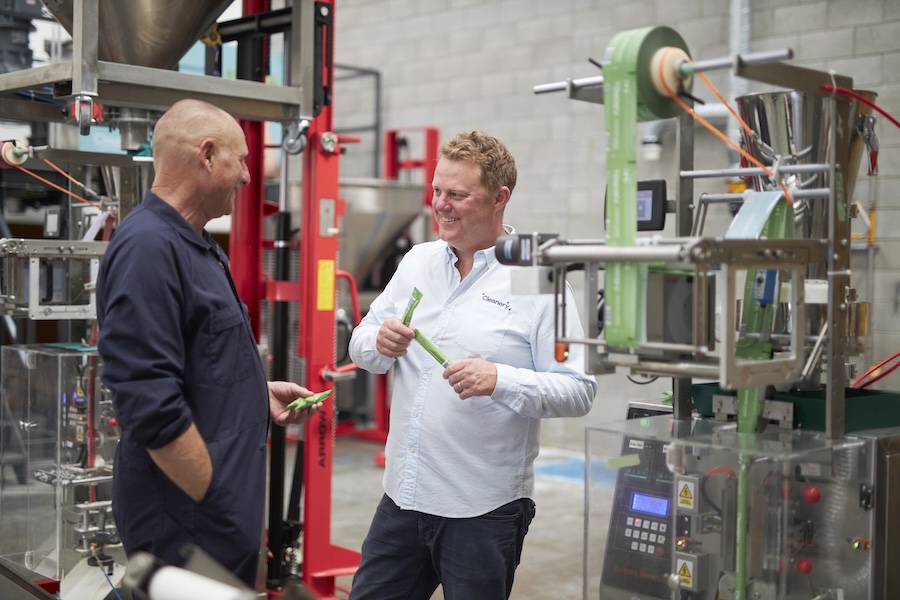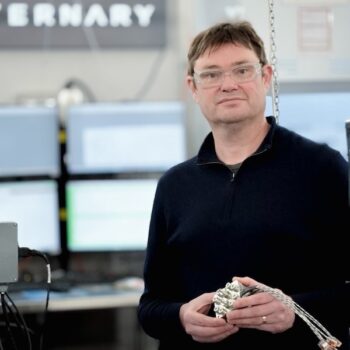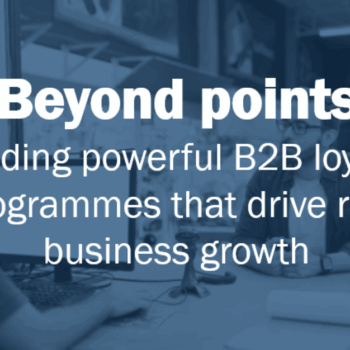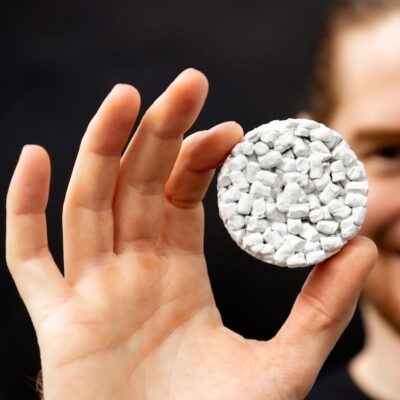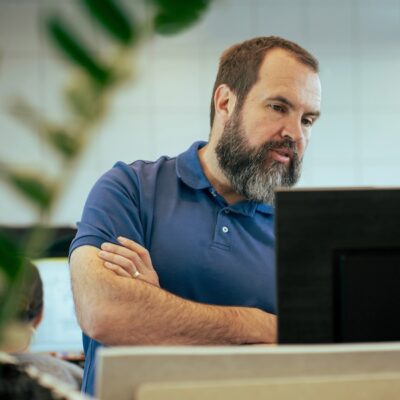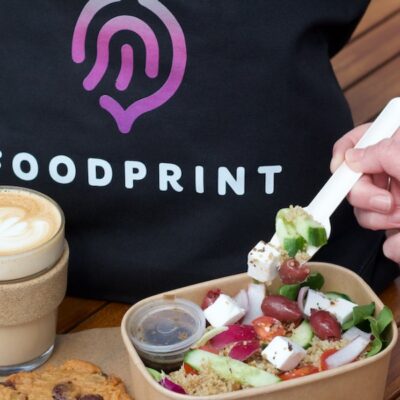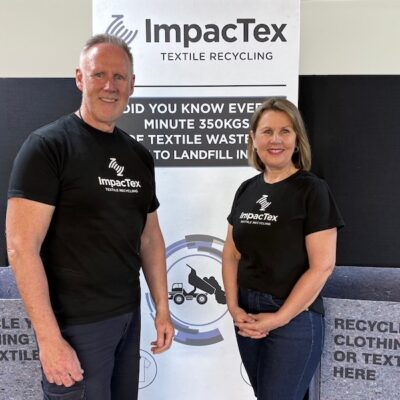The proof is in the powder. Cleanery cuts packaging waste while going global
Pictured above: Mark Sorensen at the Cleanery factory in Avondale, Auckland, is challenging large scale manufacturing.
From a kitchen mixer to a compact factory, Auckland cleaning product business Cleanery is proving that local production can compete globally while dramatically reducing environmental impacts.
Cleanery makes cleaning and personal care products in powder form, eliminating 99 percent of packaging waste compared to traditional liquid cleaners. Instead of shipping heavy bottles filled with water and chemicals around the world, customers buy small refill sachets of concentrated powder that mix instantly with tap water in reusable bottles.
Started in 2020 by Ellie Brade and partner Mark Sorensen, Cleanery products are now being sold across Aotearoa New Zealand, Australia and the U.S.
“We’ve changed the way things are done in every way – the way the products are made, stored and used, the affordable price point, and the way people engage with these products,” says Ellie.
“We thought it was crazy that cleaning and personal care, this massive half-trillion-dollar industry that touches billions of lives every day, was based on shipping vast quantities of water around the world in single-use bottles.”
In contrast, Cleanery can transport up to 500,000 refill sachets of cleaning product in a shipping container.”
Effective and affordable
From the start, Ellie and Mark aimed to create products that were effective and affordable.
Unlike many businesses that target environmentally conscious consumers, Cleanery deliberately focuses on mainstream shoppers. Its $3 refill price point makes sustainable choices accessible.
“Our passion is sustainability and helping everyday humans make small changes. We really believe that if you can convert everyday people, one at a time, one thing at a time, you make a bigger difference.”
The challenge was to create cleaning products that were easy to use and worked as well, or better than traditional cleaners.
“Most so-called eco products aren’t brilliant at cleaning and that’s one of the biggest barriers to converting people.”
Cleanery invested heavily in research and development to ensure its products, using naturally occurring plant and mineral material, cleaned as effectively as conventional alternatives.
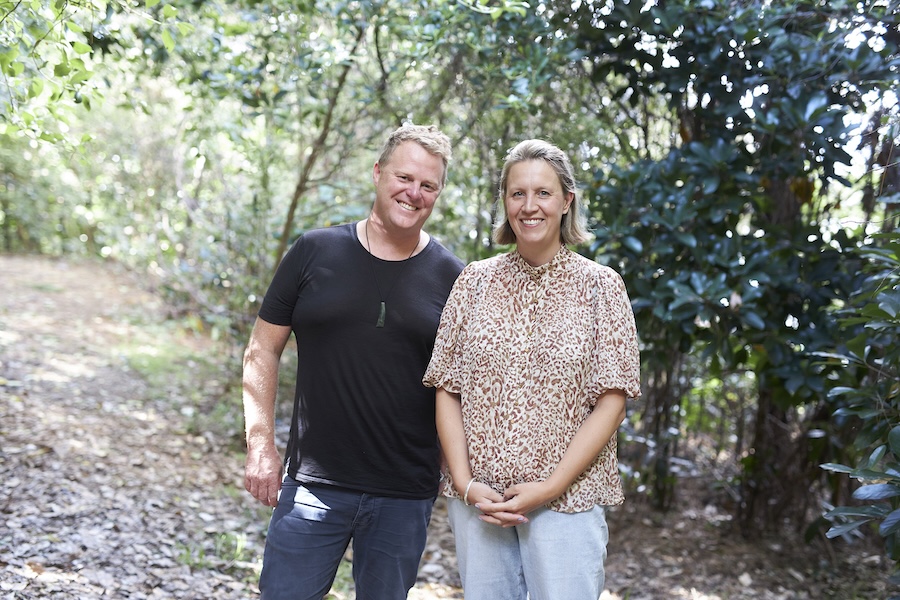
Developing those formulations in tandem with the manufacturing processes was critical to success, says Ellie.
“We were very aware there was no point in developing a product if we couldn’t deliver it quickly and scale the operation. We started with a kitchen mixer. Now we have a factory that’s beautiful in its simplicity.”
Small is better
Cleanery’s compact operation, in the light industrial heart of Avondale, challenges conventional large-scale manufacturing.
“We’ve been very clever about designing a factory that means we can manufacture in a profitable, efficient way. It’s also very transferrable – we could break it down tomorrow and put it on a ship and take it somewhere else if we wanted to.”
The operation runs on a small core team of seven full-time and two part-time employees, with the capacity to produce 200,000 refill sachets weekly. Scaling up simply means adding more filling machines alongside their master mixer.
The factory’s low emissions, low energy design often result in smaller electricity bills than a family home, says Ellie.
The COVID-19 pandemic validated Cleanery’s local manufacturing strategy when competitors faced supply chain disruptions.
“We watched a lot of people completely held at ransom by the supply chain on the other side of the world. They couldn’t get ingredients, they couldn’t get products, whereas we never have that problem.”
Cleanery faces off against multinational corporations with billion-dollar marketing budgets, yet has achieved remarkable market penetration. In Aotearoa New Zealand, it outperforms competitors in the refill category by five-to-one, says Ellie. Cleanery products are stocked by major retailers including Woolworths, New World, and most Pak’nSave stores.
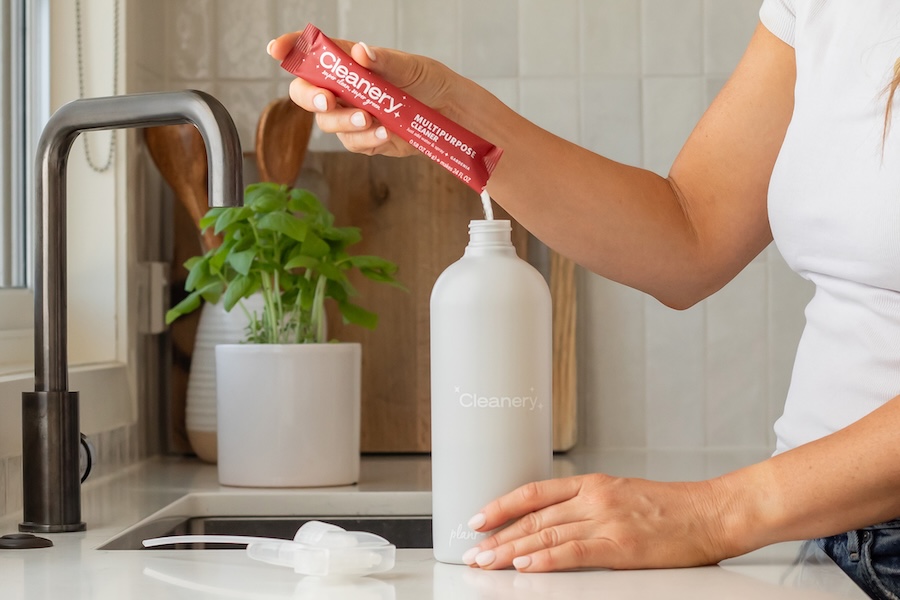
Export success
Twelve months ago the business started exporting to the U.S. Cleanery products are now stocked across 2000 stores including the US’s two biggest supermarket chains.
“America’s a really big part of our long-term journey. That’s where most of our scale is at the moment and it’s growing quickly.
“Americans love New Zealanders and our businesses,” Ellie notes, explaining how doors were opened due to New Zealand’s innovation reputation as well as the environmental goals of US retailers.
“We believe we present a compelling export story because you can keep all the IP and the employment and economic benefits in New Zealand, but you can also showcase New Zealand innovation to the world.”
Having in-house engineering and chemistry teams ensures the operation runs efficiently while working on new products and continuously making small improvements to its current range. Cleanery is also working with another New Zealand business and trialling refill sachets made from plant-based materials.
“If we can pull that one off, it’s going to be a game changer for the packaging industry as a whole, not just for us.”
Cleanery is part of the Sustainable Business Network and is included in its Next 95 list of innovators and visionaries.

